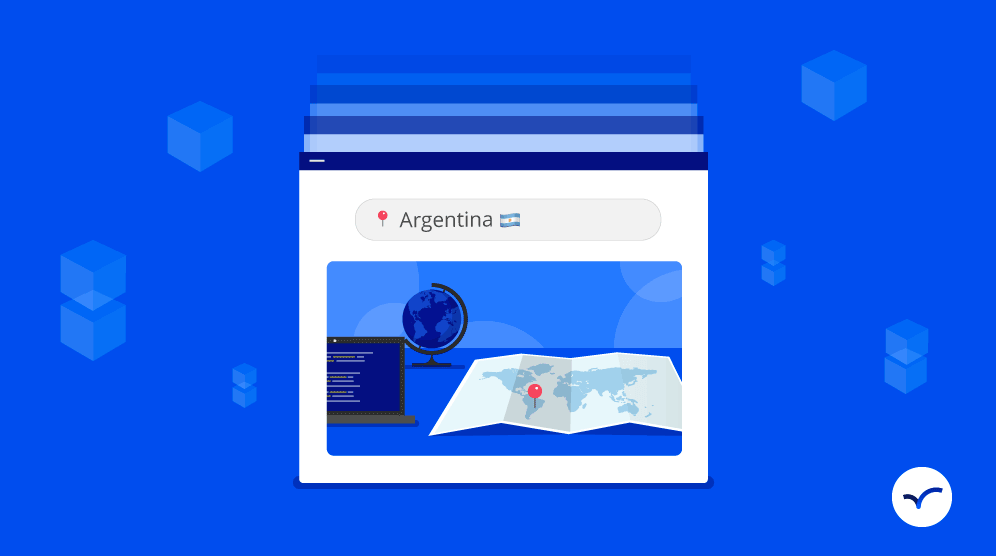As the cost of living and expenses rise in the United States and Canada, companies are looking south of the U.S. border for economic relief. While Mexico has been attractive since the 1990s due to NAFTA, American companies are now looking even further south for prospective tech hubs and talent sourcing locations.
South America has long been a place for U.S. companies to set up roots overseas. Argentina, the second-largest country in South America, is one of the first places that companies look at when considering their technical expansion overseas.
Argentina, whose capital, Buenos Aires, is called the “Paris of South America” boasts a rich history, but also plenty of STEM talent, a low cost of living, developers with great English proficiency, and tax incentives for tech companies.
Read on to see why you should consider Argentina as a potential tech hub location and/or a great place to hire remote developers.
A quick note before we start: this post is designed to give you a snapshot of Argentina’s suitability as an engineering hub location, but it should not be relied upon instead of seeking professional advice specific to your situation.
Looking for top talent fast? See how Arc can help you:
⚡️ Find developers, designers, marketers, and more
⚡️ Freelance or full-time remote + fully vetted
⚡️ Save up to 80% with global hires
Hire top talent with Arc risk-free →
Availability of STEM Talent
Since 2015, Argentina boasts more than 20,000 STEM graduates annually. There is one engineering graduate for every 5,000 people in Argentina.
There are 39+ programs for computer science in Argentina, including programs at: National Technical University, the University of Córdoba, Buenos Aires Institute of Technology, ORT, the National University of Buenos Aires, CITECH, National University Antonio Jauretche, National University of Cordoba, National Central University, and María Sánchez de Thompson Technical School.
In addition to the large number of STEM graduates, the Argentine government has sponsored a program, Plan 111Mil to train over 100,000 developers.
Developer Talent Pool
According to Stack Overflow, in 2018, there were 114,576 developers from Argentina, the second-highest in South America. In June 2019, the president of the Chamber of Industry for Software in Argentina estimated that there will be as many as 134,000 people working in Argentina’s IT industry by 2020.
In addition to a large developer pool, Argentina is also known for the quality of its tech talent: Argentina took the top spot in Coursera’s 2019 Global Skills Index for cutting-edge technical skills.
Read More: Toronto vs Vancouver: Where to Build Your Next Remote Engineering Team
Existing Engineering Teams and Tech Hubs in Argentina
In an interview with one of Argentina’s largest newspapers, La Nación, Google’s Eric Schmidt explained why Buenos Aires was chosen as a hub (translated with Google Translate):
We decided on Argentina by analyzing the quality of its university education. We usually employ young people, who have a good education; We reviewed the options we had and Argentina seemed to us the best possible business decision. When we did our analysis we saw that the country has particularly good universities, and that is a good basis for us; we rely heavily on universities. The government gave us a lot of support in this, too. When we opened the Dublin offices we had 50 people; today we have 2000. So maybe in time the same will happen here.
Amazon
According to Modaes, a Spanish magazine, Amazon chose to put its AWS data center in Argentina rather than Chile to benefit from the new export tax exemption law with a 35% to 15% reduction in income tax and to pay less in labor costs. In addition, in the free trade zone in which it will be installed, Amazon will not pay national or provincial taxes on energy consumption, which will be an important benefit. (Note — translated with Google Translate.)
JP Morgan
When interviewed about JP Morgan’s presence in Argentina, CIO Lori Beer had this to say (translated with Google Translate):
Buenos Aires has become especially relevant since it was established to meet the needs of JP Morgan in every corner of the globe. We are very excited about what is happening in Buenos Aires, which has become a critical place, a key piece that supports our banking business. Of the 1,400 employees in the service center, 600 are already in technology and we plan to reach 800 by the end of the year. The goal for 2019 is to reach more than 1000. In turn, for the entire hub, the idea is to increase the workforce to reach 2000 next year.
Rappi
Matías Casoy, country manager of Rappi, a delivery app, said to iProUp (translated with Google Translate):
When we started looking for talent for the operation, we had talks with the Colombian team and realized that Argentina stood out in Latin America for its very good technology profile.
Despegar
In an interview with iProUP, Carlos Álvarez said of Argentina (translated with Google Translate):
In Argentina we have the advantage of having a certain critical mass of innovative companies, a fairly consolidated ecosystem with respect to the region and an open and accessible educational system, which gives us a good available talent base.
Other Tech Hubs in Argentina
- Salesforce
- Medallia
- Eventbrite
- IBM
- MercadoLibre
- Globant
Read More: All You Need To Know To Build An Engineering Team in Mexico
You can also try Arc, your shortcut to the world’s best remote talent:
⚡️ Access 450,000 top developers, designers, and marketers
⚡️ Vetted and ready to interview
⚡️ Freelance or full-time
Try Arc and hire top talent now →
Time Zone Overlap: Argentina vs United States Time Zones
Argentina is in the UTC-3 time zone, putting Argentina one hour ahead of Eastern Daylight Time (EDT) and two hours ahead of Eastern Standard Time (EST).
In the spring and summer, Argentina is therefore one hour ahead of New York and Boston, two hours ahead Chicago and four hours ahead of San Francisco and Seattle.
If you’re hiring remote developers from the US or Canada, working across time zones won’t be an issue!
English Proficiency in Argentina
Compared to its Latin American neighbors, Argentina is one of the best in the region. According to EF’s English Proficiency Index, Argentinians scored 58.38 out of a 100 points — the highest score among all Central and South American countries.
In fact, Argentina was also the only country in the region with a score in the “high proficiency” range (58 to 62 points).
Lifestyle in Argentina
Argentina ranks 47th on the World Happiness Ranking and received a 6.086 World Happiness Index score. For reference, the United States ranked 19th and 6.892, respectively, and Canada 9th and 7.278.
Cost of Living in Argentina
The cost of living is generally very affordable (by North American standards). A one-bedroom apartment in the center of Buenos Aires will run $263 USD. In Cordoba and Rosario, rents for an equivalent place within their city centers are roughly $175 and $183 USD, respectively.
Remote Developer Salaries in Argentina
While Argentina is known for its sophistication and higher cost of living relative to other South American countries, hiring a developer in Argentina won’t break the bank. Below are average annual desired salaries in U.S. dollars for remote Arc Devs in Argentina:
- Front-end Developer : $61,984
- Back-end Developer: $65,353
- Mobile App Developer: $59,744
- DevOps Engineer: $66,078
Read More: How Much to Hire a Software Developer: Freelance vs Full-Time Costs
Why Argentina is a Great Location for an Engineering Team or Hub
Argentina makes an ideal engineering hub because of its affordable pool of high quality English-speaking developers, its time zone overlap with the United States (great for scheduling meetings), its low cost of living, and its tax incentives for companies in the tech industry.
If you set up your tech hub in a large city like Buenos Aires, you’ll be able to hire not only the best of Argentine software engineering talent but also emigrants from MERCOSUR countries like neighboring Brazil and Chile who have settled in Buenos Aires for its rich culture and cosmopolitan atmosphere.
While Argentina offers employees more protections than companies in the United States may be used to, it is relatively easy to move senior staff members to Argentina once your company paperwork has been filed.
All About Employment in Argentina
Employee Benefits
Argentinian employees are entitled to:
- Severance payments and minimum notice periods in case of dismissal
- Paid sick leave
- Minimum weekly rest period of 35 hours with a 12-hour break between work days and overtime
- Annual paid vacation (two weeks holiday minimum that increases with the length of employment — up to a maximum of 35 days)
- A 13th month mandatory yearly bonus
- Healthcare protection
- Compulsory retirement plan
Statutory Labor Requirements
All employees, regardless of whether they are full-time, part-time, fixed term contract, temporary, or seasonal workers, are entitled to equal benefits and conditions as full-time, long-term employees. The monthly minimum wage, as of October 2019, is equivalent to USD $261, regardless of the worker’s age and experience.
In Argentina, overtime cannot exceed 30 hours a month and 200 hours per year without authorization by the Ministry of Labour, Employment, and Social Security. Overtime hours must be paid at a rate of 50% on top of normal salary.
If your employee works during the weekly rest period or on a public holiday, they must be paid 100% on top of normal salary. A standard work day is nine hours, with a one hour lunch break.
National Holidays
There are 17 public holidays in Argentina, including Christmas, New Years, Easter, Labor Day, and Argentina Independence Day.
Read More: Canada, Mexico, and Argentina: Where to Build Your Engineering Hub
Government incentives
Tax incentives
As of June 6, 2019, Argentina enacted new tax incentives to encourage high tech businesses to relocate to Argentina. Some of these incentives include:
- A reduced income tax rate of 15% (rather than 25% or 30%)
- Exemption from value-added tax
- Deduction of a fixed amount of employer social security contributions, and
- A tax credit for the payment of income tax and value-added tax.
Ease of Obtaining Visas
Foreign nationals must have an entry permit to apply for a working visa. Entry permits can be obtained from either an Argentine embassy or consulate or the National Immigration Office. A work permit lasts for up to three years. A residence fee is about USD $130 and can take about 20 days to get an entry permit.
Before an employee can receive an entry permit, their employer has to have registered with the Federal Administration of Public Revenue (AFIP) and the single national registry of foreigner applicants of the national direction of migration.
Ease of Relocating Senior Staff
There are no restrictions on the nationality of managers and company directors other than that the majority of the members of a board of directors must be domiciled in Argentina.
If you want to move your senior staff to Argentina, you must first register before a registry of employers that hires foreigners. In order to obtain a working visa, your senior staff member should be registered as an employee of a local company in Argentina.
All foreigners have to file a criminal records certificate notarized from the country or countries where they have been living in the last three years, as well as from Argentina.
Read More: Ukraine, Poland, Estonia, Romania: Where to Build Your Engineering Team
Regulatory environment
Legal System
Argentina’s labor laws are pro-employee and comprised of public order rules. Thus, they cannot be ruled out, or waived by any agreement, applicable law, or jurisdiction clauses eventually included in any agreements. Therefore, Argentine labor law will apply (and Argentinian labor courts will have jurisdiction) in any eventual labor court claim filed in respect to work performed in Argentina.
There are also “Collective Labor Agreements” that determine labor conditions for employees. These are dependent on industry, company, and labor union. To have legal validity, they must be published in the “Boletin Oficial”.
Ability to “Do Business”
To set up a business in Argentina, it is necessary to have a permanent or temporary residence permit. In order to hire foreign workers, the work contract must be in line with labor legislation requirements. Directors and Managers are exempted from the maximum working time of eight hours a day and 30 overtime hours a month.
While overhead and labor costs are lower in Argentina compared to the United States and Canada, social security costs constitute a sizable part of the cost of doing business in Argentina.
Making Payments as a Multinational Enterprise
If your head office is based in the United States (or outside of Argentina), you will be able to pay employees or partners in Argentina after completing some registration processes. If you’re a tech company, you may benefit from Argentina’s Entrepreneur’s Law, which promotes business registration in 24 hours.
If you don’t qualify for the Entrepreneur’s Law, don’t fret — you just need to go through a few more steps. First, you’ll verify your company name with the Office of Corporations. The National Bank must hold at least 25% of the initial capital, which has to be deposited beforehand.
Then, the company must publish a company notice in Boletin Oficial, incorporate and register with the Public Registry of Commerce, buy special books, and turn those in to the General Inspection of Justice. After the corporate manager gets a Fiscal Code for the company along with a tax ID, and registration is complete with the Unified System for Labor Registration, you can officially pay employees in Argentina.
Read More: All You Need to Know to Build an Engineering Team in Brazil
Why Hire Argentinian Remote Developers:
Methods of payment
Cross-border payment options
You can pay remote developers from Argentina using Xoom, Deel, Pilot.co, TransferWise, international wire transfer, Payoneer, and PayPal. A national bank account is another option. Tax advice is advised.
Preferred currencies
While Argentina’s official currency is the Argentinian peso, developers may prefer to be paid in US dollars due to the volatility of the peso.
The Legal Side of Hiring a Remote Developer from Argentina
You can legally hire a remote developer to work for you without jumping through a lot of hoops (even fewer if they are an Argentinian citizen), but keep in mind that if he or she resides in Argentina and performs his or her work for you in the country, you will be subject to Argentinian labor laws and Argentinian labor courts, which are pro-employee and come with the employee benefits above.
Read More: How to Do Taxes When Hiring a Freelancer (Software Developer Clients)
Cultural Expectations
Employer-Employee Relations
In Argentina, meetings are often scheduled far in advance and punctuality is important. However, as in other countries, meetings may not begin and end at the designated time and displaying a sense of urgency may be viewed with mistrust or as rudeness. Therefore, when hiring and working with your remote developer, you should get a sense of their personal style and preferences, as well as make yours known.
In addition, during meetings in Argentina, people may interrupt one another. This is seen as a way of showing interest and enthusiasm rather than disrespect, which is a cultural difference that you should keep in mind.
If you plan on working with your remote developer as a full-time, more permanent, employee, you should try to deepen your relationship by being talkative and transparent. For many Argentines (but not all), one’s personal life and family are common discussion types. If you want to improve your relationship with your developer and facilitate team bonding (and only if they are receptive to this), you can initiate more personal discussions with them to make them feel included.
Holidays
Argentinian developers expect 15 paid days off per year, according to Argentinian labor law. To remain competitive in attracting developers, companies generally improve on this minimum offer, including by offering unlimited leave. Should developers have to work on holidays, they can expect 100% of their regular pay on top of their normal salary.
Benefits
Remote developers on a full-time, part-time, or contractor basis will expect full employment benefits according to Argentinian labor laws, including paid annual leave, 13 months salary, paid private healthcare, and paid sick leave.
While you may certainly offer additional perks, those are the baseline benefits any Argentinian developer receives, so you need to meet those benefits at a minimum. Note that paid sick leave for Argentinian developers is effectively unlimited, as companies will pay sick leave when a medical certificate is presented.
Read More: Top Benefits and Perks Companies Offer Remote Developers in 2022
Hiring a Full-time, Part-time, or Contract Remote Developer from Argentina
Whether you hire a remote full-time, part-time, or contractor from Argentina, Argentinian labor laws require that you treat them like a full-time employee. However, there are exceptions for fixed-term and contract employees with regards to giving notice and benefits.
For a fixed-term contract:
- A written employment contract must be executed
- The employer must serve prior notice of termination (no less than one month and no more than two months)
- In case the employer dismisses an employee without justified cause before the expiration of the agreed term, the employee is entitled to claim damages.
- A fixed term contract has no trial period.
For a temporary contract:
- There is no obligation to give any notice of termination
- No severance payments or compensations are owed when the contract finishes
- A written contract is required by law and the specific cause must be clearly described, as the employer must prove the temporary nature of the contract
- No trial period is applicable
- Law 24.013 caps the term of this contract to a maximum term of six months per year and up to 12 months on a three year period and it can be either provided directly by the employer or through an employment agency authorised by the Ministry of Labor.
Note that trial periods can be up to three months for full-time or part-time employees. Termination during the trial period can be decided without paying any compensation or severance payment other than a 15-day prior notice and the due wages.
Read More: US vs International Developers: Do Overseas Developers Get a Bad Rap?
Is Argentina Your Ideal Engineering Team or Engineering Hub Location?
If you’re looking to establish a tech hub outside of the United States or Canada, Argentina is a good candidate to consider. Argentina scores high in English proficiency and there’s a good deal of overlap with the United States in terms of time zone, making it convenient to schedule meetings and scrums.
While Argentina’s labor laws are more pro-employee compared to those of the United States, meaning that there’s no at-will employment and employees are guaranteed a 13th-month salary, health insurance, and retirement, local developer salaries are a fraction of the cost of those in the United States, which balances out the cost of Argentinian social benefits.
If you’re looking to hire a remote developer from Argentina, you’ll have a large pool of STEM graduates to choose from. While part-time remote employees do receive the same benefits and protections as full-time employees under Argentine labor law, contract workers are not subject to the same legislation, which is something to keep in mind during the hiring process.
In addition, there are many payment options when it comes to paying Argentinian remote developers, including Deel, Payoneer, TransferWise, and PayPal, making paying your developer relatively painless.
If you’re considering building your tech hub in Argentina or hiring remote developers from Argentina and you have questions, we’re happy to help with trying to answer them. Remember that you will need to seek professional advice specific to your situation if you seek to do business in another country.
You can also try Arc, your shortcut to the world’s best remote talent:
⚡️ Access 450,000 top developers, designers, and marketers
⚡️ Vetted and ready to interview
⚡️ Freelance or full-time








